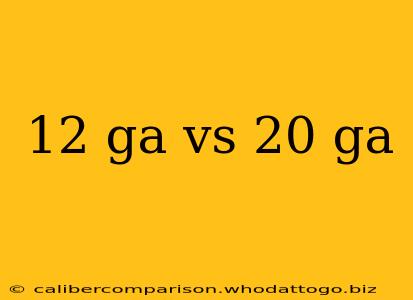Choosing between a 12-gauge and a 20-gauge shotgun is a common dilemma for both novice and experienced shooters. The decision hinges on several factors, and understanding the key differences is crucial for selecting the ideal firearm for your needs. This comprehensive guide will delve into the nuances of each gauge, helping you make an informed choice.
Gauge Explained: Understanding the Numbers
Before we dive into the specifics, let's clarify what "gauge" means. The gauge of a shotgun refers to the number of lead balls, each with a diameter equal to the inside diameter of the barrel, that would weigh one pound. Therefore, a 12-gauge shotgun means that twelve lead balls of that barrel's diameter would weigh one pound. A 20-gauge shotgun would require twenty such balls. This system dictates the bore diameter and, consequently, the shell size.
12 Gauge: The Workhorse
The 12-gauge shotgun has long held the title of the most popular shotgun in the world. Its popularity stems from several advantages:
Advantages of 12 Gauge:
- Power: The larger bore diameter translates to significantly more power and stopping power. This makes it ideal for hunting larger game, like deer or waterfowl at longer ranges.
- Versatility: 12-gauge shotguns are available in a vast array of configurations, from simple pump-actions to highly specialized semi-autos, catering to diverse shooting styles and purposes. Ammunition selection is also exceptionally broad.
- Wide Availability: Finding ammunition and accessories for a 12-gauge is rarely a problem, regardless of your location.
Disadvantages of 12 Gauge:
- Recoil: The substantial power comes at the cost of significant recoil, which can be uncomfortable or even difficult for smaller shooters or those new to shotguns.
- Weight: 12-gauge shotguns tend to be heavier, making them less maneuverable for extended periods of use.
- Cost: Ammunition for 12-gauge can sometimes be slightly more expensive per round than 20-gauge.
20 Gauge: The Lightweight Contender
The 20-gauge shotgun has gained considerable popularity, particularly among women and younger shooters, due to its manageable recoil and lighter weight.
Advantages of 20 Gauge:
- Reduced Recoil: The lower recoil makes it much more comfortable to shoot, leading to better accuracy and less fatigue, especially during extended shooting sessions.
- Lighter Weight: This makes it easier to carry and handle, particularly advantageous for hunting where you might be walking long distances.
- Improved Accuracy: For many shooters, the reduced recoil translates to improved accuracy, especially at shorter to medium ranges.
Disadvantages of 20 Gauge:
- Less Power: While still effective for hunting smaller game and upland birds, the reduced power means it's not ideal for larger game or longer-range shots.
- Ammunition Availability: While readily available, the selection of ammunition types and loads might be somewhat less extensive than that of 12-gauge.
Choosing the Right Gauge: Consider Your Needs
Ultimately, the best choice between a 12-gauge and a 20-gauge depends entirely on your intended use:
- Hunting Large Game (Deer, Turkey): 12-gauge is generally preferred for its superior power.
- Hunting Upland Birds, Small Game: Both gauges are suitable, but the 20-gauge's lighter recoil might be preferable for all-day hunts.
- Waterfowl Hunting: 12-gauge is generally favored for its range and power. However, high-velocity 20-gauge shells can be effective for closer-range shots.
- Home Defense: Both gauges are effective, but the 12-gauge offers greater stopping power. However, the reduced recoil of the 20-gauge can lead to faster target acquisition for some users.
- Sporting Clays: Both gauges are used, with personal preference dictating the choice.
Before purchasing, it's highly recommended to try shooting both gauges if possible. This will allow you to personally assess the recoil and handling characteristics of each, guiding you towards the best fit for your needs and shooting style. Remember, consulting with experienced shooters and firearm professionals can also be invaluable in your decision-making process.

